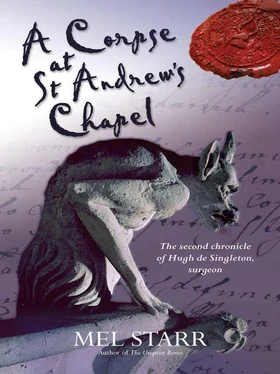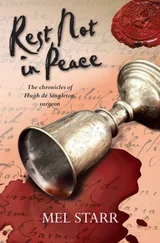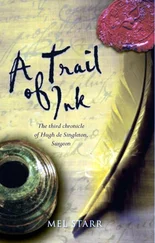Mel Starr - A Corpse at St Andrew's Chapel
Здесь есть возможность читать онлайн «Mel Starr - A Corpse at St Andrew's Chapel» весь текст электронной книги совершенно бесплатно (целиком полную версию без сокращений). В некоторых случаях можно слушать аудио, скачать через торрент в формате fb2 и присутствует краткое содержание. Год выпуска: 2010, Издательство: Kregel Publications, Жанр: Исторический детектив, на английском языке. Описание произведения, (предисловие) а так же отзывы посетителей доступны на портале библиотеки ЛибКат.
- Название:A Corpse at St Andrew's Chapel
- Автор:
- Издательство:Kregel Publications
- Жанр:
- Год:2010
- ISBN:нет данных
- Рейтинг книги:5 / 5. Голосов: 1
-
Избранное:Добавить в избранное
- Отзывы:
-
Ваша оценка:
- 100
- 1
- 2
- 3
- 4
- 5
A Corpse at St Andrew's Chapel: краткое содержание, описание и аннотация
Предлагаем к чтению аннотацию, описание, краткое содержание или предисловие (зависит от того, что написал сам автор книги «A Corpse at St Andrew's Chapel»). Если вы не нашли необходимую информацию о книге — напишите в комментариях, мы постараемся отыскать её.
A Corpse at St Andrew's Chapel — читать онлайн бесплатно полную книгу (весь текст) целиком
Ниже представлен текст книги, разбитый по страницам. Система сохранения места последней прочитанной страницы, позволяет с удобством читать онлайн бесплатно книгу «A Corpse at St Andrew's Chapel», без необходимости каждый раз заново искать на чём Вы остановились. Поставьте закладку, и сможете в любой момент перейти на страницу, на которой закончили чтение.
Интервал:
Закладка:
“And what of the wolf? You heard it howl, did you not?”
“I heard something howl.”
“Not a wolf? Or some other beast?”
“Nay. A man, I think.”
“A man? Ah…I see. This same Henry atte Bridge, you think?”
“Aye. He knew we suspected a beast in Alan’s death. ’Twas what he intended.”
“So he thought to confirm your suspicion?”
“He did, and nearly succeeded.”
“Think you, when he died, he suspected you knew ’twas no wolf attacked the beadle?”
“He knew I went north that day. He saw me pass the new tithe barn as he worked. He surely guessed what I was about, else he would not have set upon me in the road when I returned.”
“But perhaps,” Wyclif wondered aloud, “’twas only shoes he thought you would find out.”
“Would a man strike down another to protect his misgotten shoes?”
“Ah, I take your point. Was it proved the shoes belonged to the beadle, he could still protest innocence of the death, and who could say otherwise? The fellow surely thought you disbelieved a wolf had done the harm.”
“Aye. He feared I saw then what I do not see now…or see but through a fog.”
The scholar was silent for a moment.
“There was an accomplice,” he asserted. “Why else a man waiting while you were attacked on the road?”
“An accomplice who aided in the murder of the beadle, or who knew of the deed when ’twas done and past?”
“What matter?” Wyclif replied. “What matters is what the man did with his knowledge…and perhaps what he yet does.”
“He struck down Henry atte Bridge when Henry failed to kill me, for fear I would know who fell upon me, and when I might confront Henry he would entangle this other, whoso he may be, in the business.”
“Just so,” Wyclif nodded, his beard bouncing against his robe.
“The dead lamb; we watched over it two nights and saw nothing.”
“The fellow atte Bridge again, you think?”
“’Twould make a kind of sense. He wished to put suspicion on a wolf, not a man. And when the hounds were put to the dead animal they knew what we did not…they scented a man, not a beast.”
“The fellow would have used the block to tear the lamb’s throat, then slice off a joint for himself to make it seem a wolf had dined,” the scholar mused.
“And I was taken in. What a simpleton I am!”
“Nay, Hugh. Do not berate yourself so. We must all make judgment with the facts we have.”
“But I had facts I did not read aright.”
“You chose the simplest interpretation of the evidence at hand. This is always best.”
“Is it so?”
“Aye.” Wyclif reached for my arm. “’Tis not good for a man to seek complexity and falsehood where none may be. If the plainest answer prove mistaken, as now seems, time enough then to seek knots to untangle.”
“And there are knots yet,” I agreed.
“You think all these strange events be related?”
“I thought not. I sought the simplest explanation, as you advise.”
“But such does not serve, eh?”
“Too many knots. Who set out for Alvescot with a sack over his shoulder? Was it Thomas atte Bridge? He carried a sack to St Andrew’s Chapel. And who struck me down at Alvescot Church? The same man who carried the sack? Thomas atte Bridge? Or perhaps the man who put an arrow into Henry atte Bridge’s back? And there are other knots in Bampton yet to be unraveled, of which you know not.”
“Such a town! I am pleased I live in a quiet, gentle place.”
“Oxford? Where scholars dispute even a comma in the scriptures.”
“Aye, we dispute. But we do not go about clubbing one another across the skull or tearing out men’s throats.”
“Hah…I remember my first year at Baliol and the St Scholastica Day Riot.”
“Hmm. You have a point. But that was about an important matter…so the students thought. The price of watered ale…or was it wine?
“What are these other knots which bind your town?” Wyclif continued.
I told him of the baker, the baker’s wife, the smith, and John Kellet. I told him of finding Kellet at the chapel after Edmund had struck him, and his words when he thought no man heard: “Henry got hinges…I’ll have more’n that. A penny, no, tuppence a month or I’ll see that all know.”
The scholar’s brows lifted and furrowed as I told of these events. “I wonder what it is that your priest may tell to all men? And why his silence may be worth tuppence each month to the smith?”
“I think he knows of Margery’s infidelity, and Edmund cuckolding the baker.”
“I wonder how he would know this…the confessional, you think? If so, ’tis a grievous sin to tell of it. And what of the hinges? Was it Henry atte Bridge he spoke of?”
“Aye. I did not tell you of the nails which Henry used to slash Alan’s throat. They came from a set of hinges Edmund made for Henry’s door.”
“Iron hinges for a cotter’s door?”
“Aye. The priest’s words are telling, are they not? I think Henry got his hinges without payment.”
Wyclif scratched his scalp for a moment. “Which means, perhaps, that Henry knew of the smith and the baker’s wife also…else why a gift from the smith, if not to purchase silence?”
“These are my thoughts,” I agreed. “But how would atte Bridge know of the liaison, and how would the priest know what Edmund had paid for Henry’s silence?”
“Ah, we have many questions this night and few answers. But take heart, Hugh, for the questions have become wiser than those we might have asked a month ago.”
“Aye. But the wisdom has come in part through a stroke against my head. I have enough wisdom if that be how I must gain more.”
Wyclif rose from his bench and went to a chest in a shadowy corner of his chamber. The lid creaked open and I watched him fumble about in the dim depths of the box. ’Twas too dark to see what the scholar did there, but soon I heard an exclamation of success and saw him stand and turn from the chest. He held some object to him, but ’twas too dark to see then what it was.
It was a dagger. Wyclif laid it on the table before me. “You have found dangerous work,” the scholar commented, “but I see only a dinner knife in your belt.”
I was surprised that an Oxford master should own such a weapon. Wyclif must have seen this in my eyes, for he explained how he came by the dagger.
“I found this in a gutter outside Baliol College one morning during the St Scholastica Riot. I have kept it since, not for my own need, but so long as it lay in my chest it could do no harm. Now I think it time to put it to use.”
“But what of scripture? We are commanded not to kill.”
“Nay, Hugh, ’tis a mistranslation. God’s word tells us not to do murder. Is there not a difference between murder and killing?”
“Aye…I suppose. But are we not to turn the other cheek?”
“We are, when another insults us with a slap. But when some miscreant would carve flesh from my cheek or another man’s with his blade, I think our Lord would not require me to permit the fellow to do so. If murder is evil, as it is, it is a man’s duty to stop it when he can…even when the murder be his own.”
I took the dagger and slid it under my belt.
Wyclif gazed at his dark window. “We must sleep on these things and talk more in the morning. Perhaps God will grant a dream to resolve these matters.”
He did not. Oh, He granted a dream, true enough. But not of Bampton and poachers and murderers. ’Twas of Kate Caxton I dreamt. And a delightful vision it was. No wonder. So when Master John asked me in the morning if some new insight had come to me in the night, I replied truthfully that I was as confused as before. It was well he did not ask of my dreams. I would have had to lie. What I dreamed was not such that it could be told a scholar.
Читать дальшеИнтервал:
Закладка:
Похожие книги на «A Corpse at St Andrew's Chapel»
Представляем Вашему вниманию похожие книги на «A Corpse at St Andrew's Chapel» списком для выбора. Мы отобрали схожую по названию и смыслу литературу в надежде предоставить читателям больше вариантов отыскать новые, интересные, ещё непрочитанные произведения.
Обсуждение, отзывы о книге «A Corpse at St Andrew's Chapel» и просто собственные мнения читателей. Оставьте ваши комментарии, напишите, что Вы думаете о произведении, его смысле или главных героях. Укажите что конкретно понравилось, а что нет, и почему Вы так считаете.












